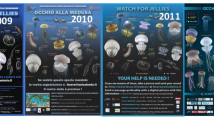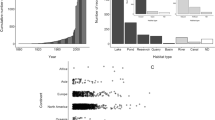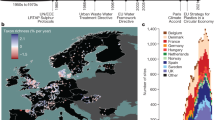Abstract
IT may be of interest to record the reappearance of the freshwater jellyfish, Limnocodium (Craspedacusta) sowerbyi, in the Victoria Regia tank of the Royal Botanic Society's Gardens, Regent's Park. The medusæ were found by us in large numbers on June 30, and some persisted over the week-end. The specimens are mostly fully grown, with an umbrella diameter up to about 13 mm. They resemble in every way the specimens first described by Allman and Lankester. These remarkable freshwater medusæ were first discovered in Regent's Park in 1880, and are reported to have reappeared there for four or five years; they have apparently not been noticed in the tank in recent years. Since its original discovery in 1880, the jellyfish has, however, been recorded from tanks in botanical gardens in other towns in England, in France, Germany, and the United States.
This is a preview of subscription content, access via your institution
Access options
Subscribe to this journal
Receive 51 print issues and online access
$199.00 per year
only $3.90 per issue
Buy this article
- Purchase on SpringerLink
- Instant access to full article PDF
Prices may be subject to local taxes which are calculated during checkout
Similar content being viewed by others
Author information
Authors and Affiliations
Rights and permissions
About this article
Cite this article
FLOWER, W., LOCKYER, S. The Freshwater Medusa Limnocodium sowerbyi in the Royal Botanic Society's Gardens, Regent's Park. Nature 122, 58 (1928). https://doi.org/10.1038/122058a0
Issue date:
DOI: https://doi.org/10.1038/122058a0
This article is cited by
-
Die s�sswassermeduse Craspedacusta sowerbii Lankester in monographischer darstellung
Zeitschrift f�r Morphologie und �kologie der Tiere (1934)



